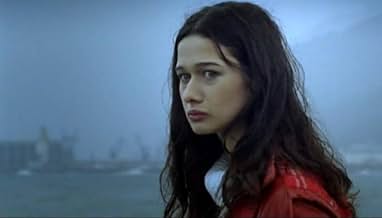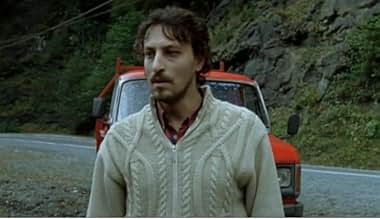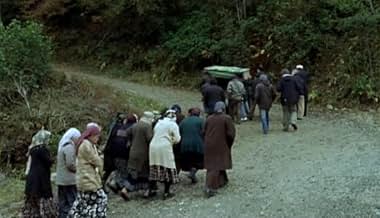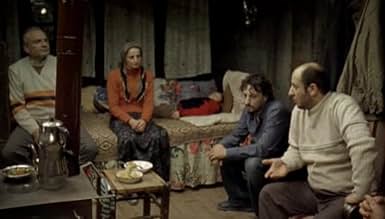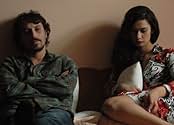Sonbahar
- 2008
- 1h 39min
VALUTAZIONE IMDb
7,6/10
7268
LA TUA VALUTAZIONE
Aggiungi una trama nella tua linguaA man struggles after his release from ten years as a political prisoner.A man struggles after his release from ten years as a political prisoner.A man struggles after his release from ten years as a political prisoner.
- Regia
- Sceneggiatura
- Star
- Premi
- 21 vittorie e 17 candidature totali
Recensioni in evidenza
I saw this debut movie at the last Black Nights FF in Tallinn. It has very strong political stance and very lyrical visual narration. Also good acting and good script is supporting this narrative. Onur Saylak in leading role is performing a great acting with a minimalistic warm and sincere play. Film tells the story of a political prisoner who has been suffered by the inhuman conditions of F-type jails. He has been released on the health ground, back to the hometown which is located in East Black Sea Region and tried to adopt to daily life again.The most impressive part of the story is his meeting with a young Georgian women who earns her life from prostitution.Their relation provides an opportunity to the audience to compare the dreams, frustrations and the pains of two people which one of them is spent his ten years in prison because of his socialist ideology and the other suffers from aftereffects of same ideology. It is a good example of New Turkish Cinema of 2000s like "My Marlon and Brando" and "Summer Book". I gave 8 this movie and strongly recommend to everyone who likes art-house movie with humanistic discourse.
this film is under the influence of ceylan work, characters that are outside of society, filmed in idyllic locations, with a lot of non narrative shots of nature, slow pace until the eventual downfall of the central character.I don't know if Turkish directors discovered existentialist approach in cinema 40 years later but those works are compelling.They really promote their country with beautiful photography and sometimes story becomes secondary, personally i started to wish visiting turkey!People who like images like me will always search of films that celebrate mise en scene.The political aspect of those films (ceylan, ustaoglu)seems to me little under developed or if you wish undermined from the tribulations of the characters, still people who take cinema more seriously than entertainment must see that body of work.
Sonbahar represents a realm that metaphorically speaking belongs to silence. Yousuf seems to have that depth with which he can journey from speech to whisper to silence.This film took sadness to a height what I have rarely witnessed in films. The Russian hooker, who is a very young mother too, says to Yousuf, "You know, you seem like you don't live in the present. ... It's like you've walked off the pages of a Russian novel." Exactly that is the point. Everything is past for Yousuf -- even his sadness too -- which is now blank because, as Michail says, everything has gone -- even socialism. Now their girls become hookers. Yousuf remains in the past, he is past everything -- even pains and all. The young boy whom he tries to teach rejects him too. All the memories of university jail and all come like scattered pictures. And that exactly is the depth of blankness depicted in this film. The sad hooker goes away. Only waves rise and fall -- rise and fall -- and everything ends with a death -- a procession of death walking through the valleys.
And one thing to say, the eaarlier review by 'eray-basma' mentioned that Sonbahar tries to be like Tarkovsky. I do not know why she/he said it. But, on my part I can say, for more than the last four decades Tarkovsky is like a god to me, both Tarkovsky and his poet father are like a milestone to me in human culture. But not a single time I remembered him during the movie. When it is only sadness and sadness -- the sadness becomes blank and all pervading. Sonbahar is that. Salute to the director.
Damn, it ends like a Russian novel too. The lonely silhouette against the troubled sea, the emptiness, the hopelessness, the sadness, the cold.
Another Turkish movie set in a small village in the mountains where time stood still and people live at their own pace, in stark contrast to city people. I always love seeing those houses, the interiors, the simple people, the daily chores, the mountains, the rivers, the fog, the rain, the greenery all around. These tend to be slow, contemplative movies but I wouldn't mind watching them cause it reminds me of my childhood in a sense and of simpler times.
There's nothing simple about Yusuf's situation. His ideals have been dashed, his health is shot, his life is uncertain, his future as foggy as the mornings to which he wakes up every day. He's also got some PTSD from jail and who knows what else is going on in his head. And what is the use after all. His friend Mikhail is a mirror of what his life could have been in the village. Then a woman comes into his life, cause there's always a woman in movies. But there's a lot more behind Yusuf's dark eyes. Surprisingly it's also a political movie to a small extent. But the ending is open cause how else could you end this pile-up on poor Yusuf...
Another Turkish movie set in a small village in the mountains where time stood still and people live at their own pace, in stark contrast to city people. I always love seeing those houses, the interiors, the simple people, the daily chores, the mountains, the rivers, the fog, the rain, the greenery all around. These tend to be slow, contemplative movies but I wouldn't mind watching them cause it reminds me of my childhood in a sense and of simpler times.
There's nothing simple about Yusuf's situation. His ideals have been dashed, his health is shot, his life is uncertain, his future as foggy as the mornings to which he wakes up every day. He's also got some PTSD from jail and who knows what else is going on in his head. And what is the use after all. His friend Mikhail is a mirror of what his life could have been in the village. Then a woman comes into his life, cause there's always a woman in movies. But there's a lot more behind Yusuf's dark eyes. Surprisingly it's also a political movie to a small extent. But the ending is open cause how else could you end this pile-up on poor Yusuf...
I saw this film at the San Francisco International Film Festival and the audience was ecstatic. Fans of Bela Tarr will appreciate the scenes with no dialog, but which still deliver more information than a babbling script could have delivered about a troubled political prisoner and a conflicted nation in a confused world. The cinematography, from the "central chair" in the home to the snowy mountains of northern Turkey were amazing. One issue that I wish that I had looked at before seeing the film was the history of Turkish/Russian relations. This is a major theme. In a similar vein for those of us who have read and loved the novels of Orhan Pamuk, we westerners learn something very important about a vibrant but conflicted country. I gave this 9 stars based on content first, with cinematography a very close second. The lead actor is incredible and this is a new director to be watched.
Lo sapevi?
- QuizYusuf and his mother speak in Homshetsi with each other- a dialect primarily spoken in Turkey's Black Sea region and South Caucasus, blending in elements of Turkish and Armenian.
- ConnessioniFeatures Zio Vanja (1970)
I più visti
Accedi per valutare e creare un elenco di titoli salvati per ottenere consigli personalizzati
- How long is Autumn?Powered by Alexa
Dettagli
Botteghino
- Lordo in tutto il mondo
- 741.768 USD
Contribuisci a questa pagina
Suggerisci una modifica o aggiungi i contenuti mancanti



